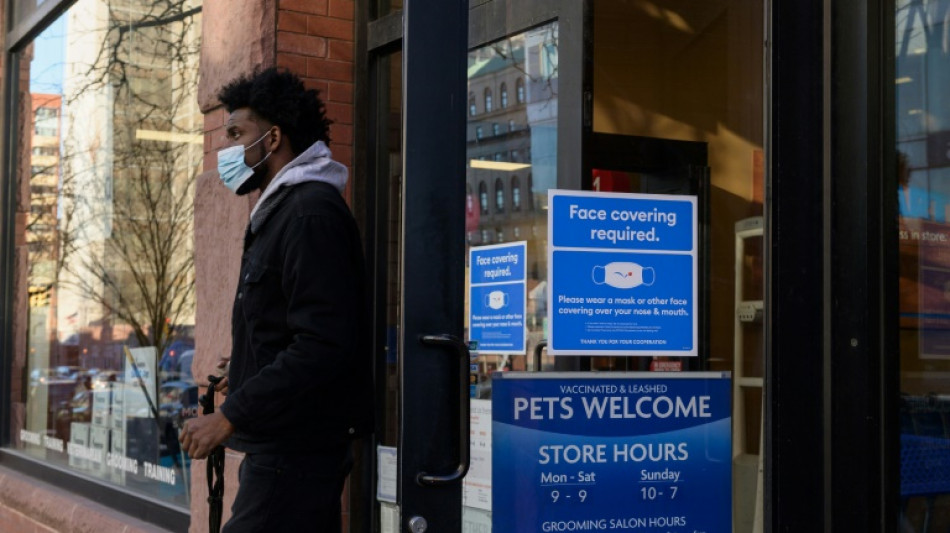
New York latest to roll back mask mandates as US eyes normalization

New York on Wednesday joined a wave of Democrat-run US states to roll back mask mandates, as health officials increasingly talk about America moving towards a phase where Covid-19 doesn't disrupt daily lives.
Masks remain a hot political issue in the United States as the country gears up for key midterm elections later this year that could determine the second half of Joe Biden's presidency.
Democrats have led the enforcement of mask mandates, while Republican-led states such as Texas and Florida have gone as far as banning the mandatory wearing of face coverings.
New York governor Kathy Hochul announced that she would not renew an indoor mask mandate for businesses when it expires on Thursday, citing a 96 percent decline in reported infections since early January.
Instead, it will be up to individual cities and businesses whether they want to require masks inside.
Hochul said the state was "trending in a very, very good direction."
"That is why we are now approaching a new phase in this pandemic," she told reporters.
She added, though, that face coverings in schools would remain mandatory until she reviews the situation next month.
Illinois governor J. B. Pritzker said masks will no longer be required in most indoor public places by February 28 but, like Hochul, kept the mandate in place for schools.
Their announcements came after several states unveiled plans Monday to lift mask requirements in indoor places and schools, as coronavirus infections fall in America.
The loosening of the restrictions also comes in response to an increasingly pandemic-weary public and as northern neighbor Canada grapples with trucker-led protests against Covid rules that have paralyzed the capital Ottawa.
California's indoor mask mandate for vaccinated residents is set to end on February 15 but unvaccinated people will still need to wear masks indoors, said Governor Gavin Newsom.
Oregon is set to lift mask requirements no later than March 31 while Delaware's will expire on Friday, with masks in classrooms ending by March 31.
New Jersey governor Phil Murphy led the way for the spate of rollbacks, announcing that children and staff would not need to wear masks in schools from March 7.
- Broadway sticks to masks -
Connecticut quickly followed, with Ned Lamont saying he was recommending that school boards drop mandatory mask-wearing in schools after February 28.
And on Wednesday Massachusetts governor Charlie Baker said his state's mask mandate for schools would end on February 28.
The lifting of the mandates still allows individual school boards to require masks if they want to.
The rollbacks signal a move towards a policy of learning to live with Covid-19 as part of everyday life.
While the Centers for Disease Control and Prevention (CDC) still mandates masks in federal government buildings and at airports and train stations, officials are upping rhetoric around normalizing life.
"We're moving toward a time when Covid won't disrupt our daily lives. A time when Covid won't be a constant crisis, but rather will be something we can protect against and treat," White House Covid-19 response coordinator Jeff Zients said Wednesday.
The varying measures highlight the disparate nature of mask rules, which can differ between local authorities in the heavily defederalized country.
A Pew Research survey released Wednesday found that 60 percent of US adults say they've felt "confused" by changing guidance about slowing the spread, up seven points since the summer.
In New York City -- which has a vaccine mandate for most public indoor settings, including restaurants, gyms and cultural venues -- Broadway said it would continue to require masks inside all theaters until April 30.
The Republican Party sought political capital from the mask announcements, with chairwoman Ronna McDaniel accusing Democrats of "lying about their shifting views on masks, mandates, and lockdowns."
More than 900,000 people have been killed by Covid-19 in the United States, according to the Johns Hopkins University coronavirus tracker.
The current seven-day daily average of cases is about 247,000, down from a daily peak of about 800,000 in early January, according to the CDC.
R.Zaccone--PV
